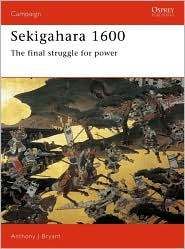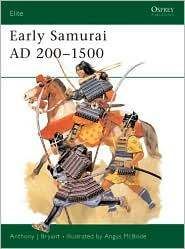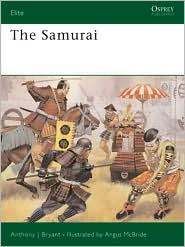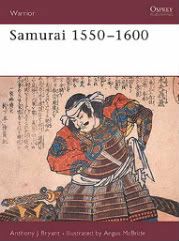On behalf of the Samurai Archives, I’m pleased to be interviewing Anthony J. Bryant, author and historian of samurai history and esteemed SA Forum Citadel member. Tony has written four books, The Samurai, Early Samurai AD 200-1500, Samurai 1500-1600 and Sekigahara 1600 that have proven their weight in gold to numerous students of Japanese history and members of the SA Citadel. Apart from being a well-respected author and historian, who has consulted on numerous projects, including the recent BBC documentary on Sekigahara called Shogun: Heroes and Villains, Tony is also renowned for his knowledge of Japanese armor manufacturing process. He’s an active member of the Society for Creative Anachronism as well as the Japan Armor and Weapons Research and Preservation Society and has also written numerous articles on the subject. Tony also has a website, Sengoku Daimyo (http://www.sengokudaimyo.com), which is a treasure trove of information related to Japanese history and armor. It’s a must-see site that should be bookmarked.
OK: How did you become interested in Japanese history? What got you hooked?
Embarrassing admission: Shogun.
When I was a freshman in college, one of my best friends was the librarian (no surprise with that!), and one day he threw me a big, fat book and said, "You have to read this. It's GREAT!" The book was Clavell's Shogun. I read it, and loved it.
I started taking Japanese history, then language, classes. Before long, I realized that if I wanted to ever graduate, I'd have to change my major to Asian Studies.
I was also getting actively involved in the SCA (Society for Creative Anachronism) at the time, and started spending more time trying to develop a Japanese "persona."
OK: It’s really no surprise that Clavell’s Shogun got you hooked. Seeing the miniseries during its original run helped to get me hooked when I was a child. I often wonder how many post-1980 Japanese professional and amateur historians are in his debt. What kind of a Japanese “persona” did you develop in the SCA? This is interesting. Can you tell us a little about it? How did it help you delve deeper into the study of Japanese history?
Well, originally it was not too well fleshed out. Kind of "generic samurai type" and late 1500s. Rather embarrassing, really, given what I've learned since. It was 90% enthusiasm and 10% knowledge. I didn't really get a handle on what a *real* Japanese persona would have been like until I went to live and work in Japan in 1986.
I've been told by a few people since then that I've kind of become the SCA's "go-to-guy" for Japanese stuff, but I don't think that's as true anymore. There are more and more people who are expanding the field of knowledge out there. A few of them have been my apprentices, like Josh Badgely here in the forum, but others like Lady Fujiwara (Kass McGann; it's a sin that she hasn't been made a Laurel for her work), Lady Saionji (who spends part of her time as "Lady Jehanne") Lady Solveig, and Count Raito (who is, by the way, currently king of Northshield) are spreading the good word and pushing the outside of the envelope. House Yama Kaminari has a very visible presence, and every year they manage to get a bit better and better (although I still am somewhat nonplussed about samurai camping out in yurts -- I thought we whupped the Mongols when they came calling
OK: I know from interacting with you on the SA Citadel Forum, you are fan of Heian through Azuchi-Momoyama history, but this is a fairly large timeframe. Is there a particular period that fascinates you more than others?
Oof. Tough call.
I think I like *most* periods of Japanese history, but for different sets of reasons. It's almost easier saying what I *don't* like. (Generally, Edo bores me to tears, although there are shining moments, events, and people that grab my interest.)
I'm particularly interested in the "high-Heian" court culture. I'm fascinated with the development of the Court and ranking system. The "soft culture" in particular appeals to me. That is, what was the LIFE of a courtier like? What did he eat? What did he wear? How did he get around? What did he actually DO for the greater part of the day, when he wasn't writing maudlin love poetry on the tear-dampened sleeves of his night-dress? (I think it may be a sad admission, but I actually have about five books in my professional library with the words "yûsoku kojitsu" -- 有職故実 -- in their titles. It's a hard term to translate, but basically it's something like "the way they used to have and do things," and it's all clothing and equipment and furniture and ranks and so on.
On a related note, I am fascinated by the power transition from the court in Heian Japan to the bakufu in Kamakura Japan, and the character of Taira no Kiyomori as a bridging figure. He literally was at once the last civil ruler, and at the same time the first martial class ruler -- a true bridging figure.
As a military junkie, the rise of the samurai fascinate me. The totally different natures and functions of governments of the three bakufu are startling, and actually something that most people probably don't even think about. A shogunate is *not* just a shogunate, and all things are not equal.
OK: You’ve already mentioned Taira no Kiyomori. Is he the most interesting persona from Japanese history for you? If not, who do you find the most interesting and why?
Miyamoto Musashi.
No, just kidding.
At different points in time, I have dad different "heroes" so to speak. I have, in due course, cycled through Yoshitsune, Takeda Shingen, Kusunoki Masashige,
As I read more, I find my opinions changing, though, as I begin to realize that much of the Western concept of the ideal samurai (whatever that may mean) and characters conventionally deemed worthy of respect, are what I consider the product of "lies told to gaijin" -- a variation on "lies told to children." For example -- yes, Yoshitsune was a tragic figure. He was also, apparently, rather capricious, a bit overly impulsive, and either naive or stupid beyond sane levels. Either he didn't realize he was being used, or was willing to let himself be for personal gain -- and that was a fatal character flaw. Was he a great hero, or just another mook?
To say I was interested in Nobunaga, Ieyasu, or Hideyoshi would be almost a cliché.
As I did research for Sekigahara, I found myself more and more being drawn to the personalities of Ishida Mitsunari and Kobayakawa Hideaki -- mostly because SO much is really not known about their true goals and motives, as those left to tell the story were not on their sides. I think it might be precisely the very opacity of the history there that is the reason I like them so much. Much of their "bad press" may be (I emphasize *may* be) attributable to their hostile biographers, and so much more is up for speculation that it's a never-ending source of speculation and opinions.
OK: What you just said about Ishida Mitsunari and Kobayakawa Hideaki is quite interesting. These are fascinating characters. Why do you suppose that they’ve been largely ignored in English-language scholarship and publications? Can you really attribute this, though, to hostile Japanese biographers? After all, the pickings in English are slim or next to none about some of the other titans of the Kamakura, Muromachi, Sengoku and Momoyama periods. This bothers me, as I’d love to see well-researched and equally well-written books on people like Uesugi Kenshin, Ashikaga Takauji, Date Masamune, Hojo Soun, Kato Kiyomasa, etc.—just to name a handful. Why do you think this is the case? Has there been an Edo period “bias” among researchers in the past?
Well, by "hostile biographers" I mean their immediate biographers. People who kept the records, and wrote diaries, shortly after the events transpired. And, certainly, through the Edo Period. In the police state that was the Edo bakufu, you wouldn't expect to find anyone doing the research to prove that the dynasty's founder was actually a crafty and Machiavellian usurper -- but that's exactly what he was. So the histories naturally would have painted Mitsunari, at least, in the worst possible light. The only question that remained for them was motive, and there's a host of possible suggestions, none of which would have been to the credit of a good man. So I have to wonder if they were protesting a bit too much. Mitsunari clearly was an ass, someone greatly lacking in the social skills to carry off his great endeavor, but I have to think he was also loyal to the one person who'd always been good to him -- Hideyoshi. That's why I tend to think his motives really *were* to preserve the Toyotomi. He just didn't think it through as well as he should have, and managed to cheese off the wrong people on the way.
The reason he and Hideaki and others have been largely ignored, I think, is that they're really just barely more than footnotes on Ieyasu's juggernaut onslaught to historical importance. Ieyasu is *such* a dominating person, and he had *such* an effect on the history of Japan that everyone else is in his shadow. And, really, it's always been like that. How many people can name the kings and princes Napoleon crushed in his effort to dominate Europe?
As to the English language world -- all those great names you mentioned are still suffering from the "extremely foreign" disease. Japan does not share the roots of our Western heritage in the same way that Thermopylae, Carthage, the Gauls and Celts, the Vikings, the Crusades, and the Renaissance and Age of Reason do. They are *outside* of that. Thanks to geography and Heroditus, we in the West are even more connected to Asia Minor (and especially a perennial favorite of Discovery TV, Ancient Egypt) than we ever will be to China or Japan. They are always going to be "the Other."
As a result, any market for books about them -- especially serious academic studies (which have a notoriously narrow interest *anyway*) -- is bound to be, sadly, small.
It's one of the reasons why, when people tell me they want to learn all about this or that really specialized area, I tell them to learn Japanese. There really is no option in the forseeable future.
OK: How did you find the Samurai Archives and what drew you to its forum?
Ancient history.
I was involved with a couple of Delphi forums, so one day I did a search of their forums for "Japanese History" and found the old Delphi Samurai Forum. (I think that was in 1837, when computers were powered by gerbil wheels.) And I've been with the gang ever since, through the various incarnations.
OK: Let’s talk about your books. Your works are often labeled as “MUST-READ” for those who want to start learning about samurai history. What made you decide to write? Were beginners the intended target audience of your three general books on samurai?
It's an honor to hear something like that, but I don't know if I totally buy it.
I don't know if I'd consider them "must read" books, but I *was* trying to make books that were popular -- and by that, I mean popular in the sense of "Japanese history for everyone" rather than academics. I think to an extent I paid for that academically -- a few people clearly had me pegged as "non ivory tower material" for trying to get the hay off the loft and onto the floor where the horses can get at it.
I like to think of my books as the gateway drugs to Japanese historical studies -- that after reading mine, they might find their way to read Elisonas, Friday, Gobbel, Farris, Jansen, Mass, et al.
The popular history aspect has paid off in some ways, however, as people seem to view me as more accessible, perhaps, than cloistered professors may be.
As to what made me start, though... well, that's really serendipity. When I wrote my first book for Osprey, there was only ONE other Japanese title -- Steve Turnbull's "Samurai Armies 1550-1600." I was really into Kamakura at the time, and living in Japan, so I knew there was a big hole there. Centuries of uncovered material. So I wrote Osprey a letter, suggesting that I should write a complementary book taking samurai up to 1550, and provided my professional and "interest" qualifications. (At the time, I was editing Tokyo Journal, so I had plenty of experience as a writer.)
They suggested, instead, that I should write a more detailed book on the samurai for a new line they were starting, called "Elite" -- and after that one, asked me to do a second Elite title that was more in line with my original suggestion. If memory serves, they actually asked me to write the last two or three I did. By the time I finished Sekigahara, I was back in the States and removed from general access to Japanese museums and battle sites.
OK: I guess it’s inevitable, but as you both have been published by Osprey, your works and those of Dr. Stephen Turnbull often get compared as you both have written about similar subject matters. Both you and Turnbull have done an invaluable service in terms of making samurai history accessible to the English-speaking world. However, I tend to view your books as the “next step” after reading Turnbull’s non-specific campaign or fortification-related Osprey works. He focuses on the “general”, while you tend to focus on the technical details—such as arms and armor and how they correspond to the times you are writing about. Do you think this is a fair assessment?
Well, my big thing is armour, after all. What they wore, what they had with them -- it's that "yûsoku kojitsu" thing.
I think people expect me to have a love-hate relationship with Turnbull -- but I've never actually met, spoken with, or even written him.
I probably should drop him a line someday.
The thing is, the first HISTORY book I read about Japan -- not Shogun, but a real book about real Japanese people -- was his The Samurai, published in 1977. It went with me to Japan, and I *still* have it with me today. That book, as much as anything else, set my feet on the path I eventually followed.
OK: I believe that like Clavell, many of us also owe a debt of gratitude to Dr. Turnbull, who is often on the receiving end of a lot of scorn by the academic community. How has the academic community reacted to your writing and research? I believe that Sekigahara is used as a text in some university classes that focus on samurai history.
That would please me immensely.
Actually, it was rather a schizophrenic response. In some ways, as a grad student, the fact that I'd actually *published books* on what I was studying was a bonus -- but in other moments, the fact that they were so... well, basic, all-encompassing, and (gasp!) unacademic hurt.
I do remember with some pleasure in one of my history seminars as we approached the battle of Sekigahara, the teacher started his lecture by actually quoting the first line of the book to us. And then he MENTIONED the book, and pointed to me, and said "He wrote the book on this battle." He gave the lecture, but allowed me to frequently interject commentary. That was the single best day I ever had as a graduate student, and I'll never forget Professor Wilson for that kindness.
OK: How do you feel about the current state of Japanese historical academia? As alluded to before, many people feel that the Sengoku period seems to have fallen by the wayside among academic circles. As a specialist of the Sengoku period, have you ever had the desire to pursue a full-time career in academia?
Sore subject, but the short answer is, yes. That *had* been the goal.
OK: You are also an expert on samurai armor and the art of how they are made using the traditional techniques. It is my understanding that you spent a considerable amount of time studying this art and have made some beautiful pieces yourself. Would you consider picking up the tools of the trade again? While the market is small, I’m sure that some collectors would pay handsomely for custom-made armor sets. Do you have any pictures of some pieces that you made that you’d like to share with us?
Not anymore, I don't. I have a nasty habit of giving things away. When I got into stained glass for a few years in college, I did a pile of windows, boxes, and so on. I don't have a one. Ditto wood carving, oil painting, etc.
Sigh.
If I am ever in a position, however, to have the *space* to start something up again, I would like to. I am currently suffering "apartment hell" -- with too many hobbies and not nearly enough space for any of them.
OK: As you know, some SA Citadel Forum members as well as friends have been pressuring you to write something new on the battle of Sekigahara. Your book of the same title is a gem, but the 96-page format of the Osprey Campaign Series of books doesn’t leave you the room to go into the details that many of us hunger for. Are you considering a return to this fascinating topic? I’d also love to see you take this topic on in a way that inclusively covers the run-up to the confrontation between Ishida Mitsunari and Tokugawa Ieyasu as well as the Kyushu and northeastern Japan campaigns and associated political intrigue.
Yes, and I've found it's really difficult to touch-type with one arm wrenched behind one's back.
As a matter of fact, I have notes now, and vague outlines, for a sort of Sekigahara "double-whammy" -- a *real* serious, and more in-depth history of the battle, as well as a novel about it. The novel is the one I really like the idea of, as THAT'S where I'd get to let all my evil theories and rampant speculation take wing. The trick would be finding markets for them.
This all started again when I was doing the research for the BBC's docudrama episode "Shogun" about Tokugawa Ieyasu and Sekigahara for the series "Heroes and Villains." As I started going back through my research, I found out (again) how fascinated I was by this battle, and all the political machinations that took place before it. It was invigorating -- to fall in love with the history all over again. And to realize how much never made it to the Osprey book.
OK: Well, we’re all waiting for those Sekigahara books, so get on with them! Don’t make us wait too long, okay? Do you have any other projects that you are working on that you can tell us about? Would you ever consider a foray into the world of historical Japanese fiction?
Well, I just finished a round of edits on a book called Himiko for Kurodahan. The author is an Italian gentleman by the name of Massimo Suomare, and it is an almost painfully annotated and examined look at Japan through the eyes of writers of the early Chinese chronicles. It's amazing how much history is in them, and how much history is *not* in them. So much -- so very, very much -- is speculation on the part of modern historians trying to read between the lines.
Who was Himiko? What was her connection to Amaterasu? And to Empress Jingu? And where -- and what -- was Yamatai? Or was it Yamai? Or was it Yamadai? And what was Wa?
It's a fascinating -- but very difficult -- book. The format is slightly intimidating, but when it comes out, I think a lot of people will like it.
As to my own projects -- wow, historical Japanese fiction.
I'd love to. I have so many ideas for things -- but I remain concerned about marketability.
OK: In terms of Japanese history, what have you recently been reading for leisure?
Promise you won't laugh.
I just picked up Selling Songs and Smiles: The Sex Trade in Heian and Kamakura Japan by Janet Goodwin. So far, it looks great but... well, the darned thing's not illustrated.
OK: Who are your favorite historians and what books would you recommend? What about for Japanese historical fiction?
I have to start with my old boss at IU, Jurgis Elisonas (who did most of his publishing under George Ellison). His Deus Destroyed is *the* history of Christianity in Japan, and one of my favorite books on Japanese history.
The late profs. Marius Jansen and Geoffrey Mass left an incredible void -- their work, and the work of their erstwhile students, is incredibly valuable.
Anyone interested in samurai per se should definitely look into the works of Wayne Farris and Karl Friday.
Really, the list of recommendables would be way too long.
As for Japanese historical fiction -- well, it depends. I love JAPANESE Japanese historical fiction. I enjoy Yumemakura Baku's Onmyôji series, and I loved Tsuji's Azuchi ôkanki (which was translated into English as the must-read novel The Signore).
As for Western-written J-fic, however... I'm not overly impressed too much with some of what I've seen. But then again, I'm hyper picky. I can't read Shogun anymore -- the book that started it all for me -- for the picky errors in it.
Like a cop who's thrown out of a story mentioning a silencer on a revolver (pointless -- they work on semi-autos, but not revolvers), I'm thrown out of a Japanese historical story for mentioning the wrong garment, the wrong color on a robe, wax candles in a Heian mansion, etc. And so many writers have the "exotic disease" -- they HAVE to use Japanese words when there's a perfectly fine English one, just because the novel is set in Japan.
Maybe I've been an editor too long. It's hard to read for pleasure sometimes.
OK: Thank you, Tony. This has been a lot of fun, and as always, very interesting!




All of Tony Bryant’s books can be purchased from the Amazon-run Samurai Archives Bookstore http://astore.amazon.com/samurai-20.
If any blog readers have a question for Tony, post them to the comments before October 10th and I’ll forward them to Tony, to be answered in a later post.
No comments:
Post a Comment